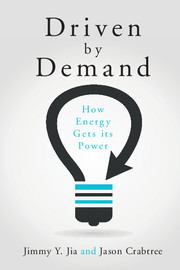15 - Bringing it all together
from Part V - Societal advancement
Published online by Cambridge University Press: 05 June 2015
Summary
Traveling in time and space from the Big Bang to the Sun and through the ages of the Earth we note that energy conversion is the prime mover in the evolution of life and the universe.
Reiner Kümmel (2011)Energy exploration, extraction, transport, transformation, and utilization are all driven by human demand for energy outcomes. Unfortunately, most conversations deal with energy products and resources. The development of specific resources and the emergence of energy-related technologies center around the desire to liberate human labor for higher-value tasks. In many ways, the control of energy resources is synonymous with wealth. For early agricultural societies, technologies of animal-driven mills or water pumps were transformative. In Latin, the word for money or wealth, pecunia, originally referred to cattle property (Kümmel, 2011). This is unsurprising, given that land owners had the resources to support the domesticated animals which served as the primary means of transforming solar energy into forms more useful to human societies of the era. Moderately more advanced societies gained tremendous benefit from the first wind- and water-based prime movers which directly harnessed nature without the overhead costs associated with animal engines. The same territory-centric model of harnessing diffuse energy from harvesting natural resources and agricultural products is an oft-ignored but foundational component of the Westphalian state. Most of human history is dominated by wealth as a derivative product of land ownership and value as a flow (strongly correlated with, or even coupled to, the amount of expended human labor) stemming from commodities markets (Hall and Klitgaard, 2011).
The mechanization of society at scale, beginning with the Industrial Revolution, decoupled the accumulation of wealth from ownership of vast natural resources or lands. This shift is largely responsible for enabling unprecedented economic growth and improvements to amenities enjoyed by average people.
- Type
- Chapter
- Information
- Driven by DemandHow Energy Gets its Power, pp. 309 - 332Publisher: Cambridge University PressPrint publication year: 2015

